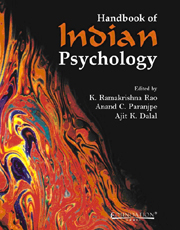Book contents
- Frontmatter
- Contents
- Contributing Authors
- Preface
- 01 Prologue: Introducing Indian Psychology
- 02 Indian Thought and Tradition: A Psychohistorical Perspective
- PART I SYSTEMS AND SCHOOLS
- PART II TOPICS AND THEMES
- PART III APPLICATIONS AND IMPLICATIONS
- Pronunciation and Transliteration of Sanskrit Alphabet
- Glossary
- Index
Preface
Published online by Cambridge University Press: 26 October 2011
- Frontmatter
- Contents
- Contributing Authors
- Preface
- 01 Prologue: Introducing Indian Psychology
- 02 Indian Thought and Tradition: A Psychohistorical Perspective
- PART I SYSTEMS AND SCHOOLS
- PART II TOPICS AND THEMES
- PART III APPLICATIONS AND IMPLICATIONS
- Pronunciation and Transliteration of Sanskrit Alphabet
- Glossary
- Index
Summary
Indian psychology is a complex subject variously viewed as esoteric and spiritual, philosophical and speculative, practical and ritualistic, and of course, as we believe, systematic and scientific understanding of human nature. There is truth in all these characterizations.
Handbook of Indian Psychology is an attempt to frame the treasures of Indian psychology in the form of a book. It is the first in a continuing series of books of the Indian Psychology Book Project (IPBP). This project was conceived by a group of eminent psychologists in India that includes Dr Matthijs Cornelissen of Sri Aurobindo Ashram, Pondicherry; Dr Sangeetha Menon of the National Institute of Advanced Study, Bangalore; Professor Janak Pandey of Allahabad University and Professor Girishwar Misra of Delhi University in addition to the three editors of this volume. The IPBP came into being in 2003 following a special meeting convened by the Institute for Human Science and Service in Visakhapatnam.
The IPBP is intended to help rejuvenate Indian psychology. We believe the time is ripe for a renaissance of Indian psychology because of a number of reasons. First, psychology in India is in such a sorry state that it is widely felt that it needs to take a round about turn and look back into its own tradition and learn from it. It need not march mindlessly in a “catch up with the West” game in an uneven field, with mismatched tools. There is an increasing realization on the part of young scholars as well as senior professionals that the key concepts and core categories used in past psychological studies in India are simply inappropriate.
- Type
- Chapter
- Information
- Handbook of Indian Psychology , pp. xvii - xxPublisher: Foundation BooksPrint publication year: 2008

